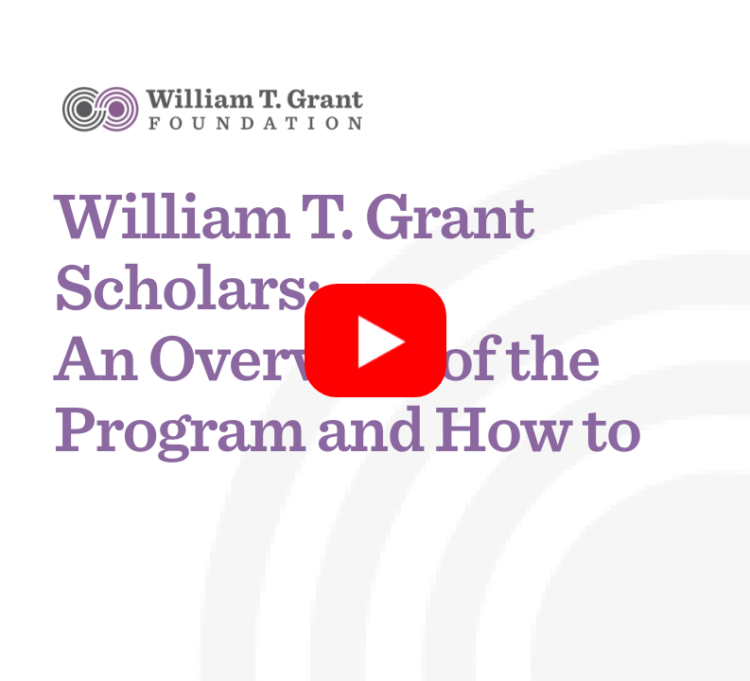The William T. Grant Foundation is delighted to announce the newest class of William T. Grant Scholars:
- Raquel Muñiz Castro, in the department of educational leadership and higher education at Boston College, will research professional networks’ role in shaping evidence use among lawyers engaged in youth advocacy.
- Julius Oatts, in the department of ophthalmology at the University of California, San Francisco’s School of Medicine, will investigate inequalities in childhood vision loss in Navajo Nation and identify ways to improve childhood vision health for Navajo youth.
- Natasha Quadlin, in the department of sociology at the University of California, Los Angeles, will explore the school-to-work transition for low-income students and evaluate ways universities can better support students’ job search.
- Amanda Raffoul, in the department of nutritional sciences at the University of Toronto, will study how youth-led legislative advocacy can improve evidence use in eating disorder prevention policy.
- Ying Shi, in the department of public administration and international affairs at Syracuse University, will examine the impact of hate crime and school victimization exposure on Asian students in the U.S. and determine ways schools can mitigate the exposure’s harmful effects.
Launched in 1982, the Scholars Program supports the professional development of promising early-career researchers. To date, the program has sponsored more than 200 talented researchers.
Scholars receive $350,000 to execute rigorous five-year research plans that stretch their skills and knowledge into new disciplines, content areas, or methods. “It’s a real pivot in my research agenda and in my training, but it’s something that I’ve wanted to do for a long time and it’s necessary to understand policies and programs that can really make a difference in reducing inequality,” said Quadlin, who will be introducing qualitative interviewing and analysis into her research on the school-to-work transition for low-income students. “I’ve wanted to know a lot more about how people actually experience institutions and … about people’s personal histories and the things that they actually have to say.”
“It’s a real pivot in my research agenda and in my training, but it’s something that I’ve wanted to do for a long time”
For Raffoul, whose project on youth eating disorder prevention will stretch her knowledge on participatory research methods, “I’m hoping that I’ll be able to gain the skills that will sustain a long career in eating disorder prevention and public health policy, but also in improving the use of research evidence. Especially for those of us who are early career folks, we don’t always have opportunities to shift perspectives or learn new skills. I’m really grateful that the program allows for that.”
Oatts, whose background is in pediatric ophthalmology, will develop expertise in qualitative and mixed-methods research through his work on childhood vision loss in Navajo Nation. “Now that I’ve established myself in my sub-specialty, I’ve realized the value of qualitative research in answering questions that aren’t traditionally answered, or aren’t answered to the level of nuance or detail, with traditional quantitative research methods. [The Scholars program] felt like a great opportunity to synergize my professional, clinical interests with my personal interest in promoting health equity,” he said.
Recognizing that early-career researchers are rarely offered support to take measured risks in their work, the award also includes funding for mentorship from experts in areas pertinent to Scholars’ development. “I’m the recipient of terrific mentorship on this project already, and I’m deeply indebted to everyone who supported me in the process,” said Syracuse’s Shi. As she studies the effects of hate crime exposure on Asian American student outcomes, Shi will receive mentorship on the study of Asian Americans by Jennifer Lee at Columbia University and on machine learning by Michiko Ueda-Ballmer at Syracuse University, who have been “so supportive and such cheerleaders for this type of work. … Having them say this is important gives me a lot of energy and validation.”
“Especially for those of us who are early career folks, we don’t always have opportunities to shift perspectives or learn new skills. I’m really grateful that the program allows for that”
Additionally, Scholars will have opportunities to further their research and professional development through annual retreats and workshops with fellow Scholars, Foundation staff, and other senior researchers. “There’s such power and benefit to continual feedback, especially as an early-career researcher,” said Muñiz Castro, who is researching professional networks’ role in shaping evidence use among lawyers. “The opportunity to develop my networks, no pun intended, with other fantastic scholars who are up and coming in the field, the ability to share ideas to hear from others to build off what others are sharing—that’s something that I see as so generative.”
“The Scholars award aims to facilitate career development by providing grantees with the resources necessary to expand their research skills and capacity to solve the problems that arise when conducting a large-scale research project. We look forward to seeing how each of the projects develops and offering support when things don’t go as planned,” said Program Officer Melissa Wooten.






